CEO of SuperPort Vietnam discusses sustainable development
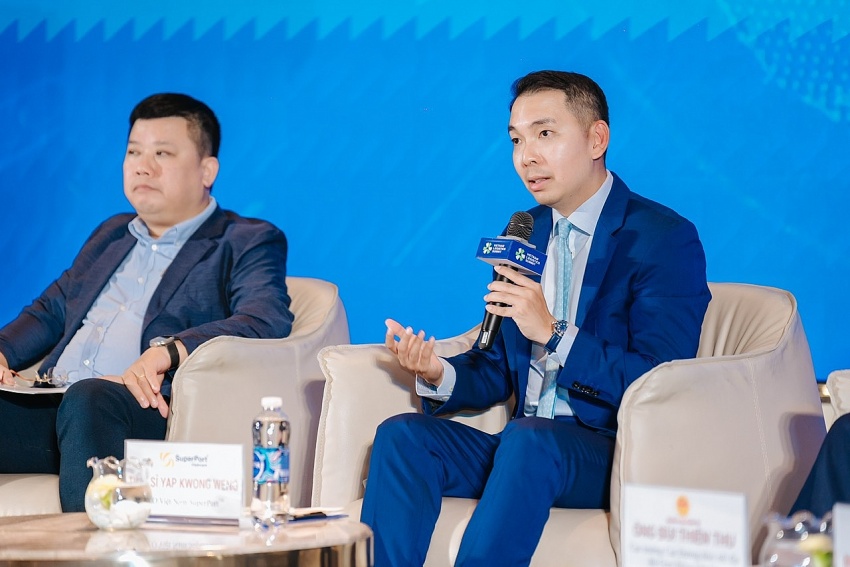 |
| Dr. Yap Kwong Weng, CEO of Vietnam SuperPort was a paneslit at the Vietnam Logistics Summit 2024 took place in Ho Chi Minh City on October 31 |
How do you see the challenges faced by Vietnam's logistics industry, such as weak infrastructure, legal barriers, and shortage of skilled labour, impact supply chain investment?
Once multiple hurdles arise, both from the legal side and in policy implementation, waiting times will increase, this in turn, will affect the execution process.
The opportunity cost lies in other countries stepping in and to establish their own supply hubs and integrated logistics hubs. During its period of growth, Vietnam risks losing its competitive edge in this area. Vietnam’s logistics costs are notably high, estimated at around 16.8-18 per cent of its GDP. This figure is significantly higher than the global average of 10.7 per cent. Singapore also faces high costs. Singapore stands to gain because they are much more efficient.
Second, Thailand also has a strong logistics space, which is quite competitive now.
Speed to market falls primarily within the realm of business operations rather than government oversights. However, if government agencies can effectively support businesses in increasing their speed to market, then their objectives will be significantly achieved.
Revenues earned, development and foreign direct investment will come in when businesses grow. Businesses from different parts of the world are waiting to see how Vietnam develops in terms of their policy implementation, political transition, and potential for economic development.
What is your assessment of how the logistics industry has developed here over the past few years?
Compared to the past years, logistic hubs in Vietnam still need a lot of improvement in critical infrastructure, such as the railway system, airports, and cargo terminals.
Vietnam needs to see logistic hubs as a whole, not as compartmentalised sections in each group. This calls for inter-agency support. The government has to lead this effort to bring the different companies together, including the industry partners, including the tech companies because this is an ecosystem.
In addition, narrowing the gap of capacity is of utmost importance. Then, it is crucial to identify solutions that bridge this gap and facilitate rapid acceleration, enabling Vietnam to enhance its competitiveness and move up the industry positioning curve.
Vietnam faces challenges in logistics infrastructure development, ranking 43rd in the World Bank’s Logistics Performance Index for 2023, indicating that there is considerable room for improvement.
But having said that, it would be useful to have some case studies done of developed economies to understand the initial phases of the logistics sector and how to progress.
One of the key issues is to study market forces and understand how these interact with the industry. We need a formidable approach to effectively engage private sector dynamics, as private sector forces do not respond solely to government intervention.
Private sector forces operate based on their own business models, depending on certain economic conditions and also geopolitical conditions. Therefore, when studying these dynamics from a market force perspective to develop a long-term outlook, we cannot focus solely on the next three to five years, we must consider the next 15 to 20 years.
Establishing industrial parks in urban areas, making bold decisions to expand airport and cargo capacities, developing super ports, incorporating new technologies and enhancing the skills and training of the workforce are crucial steps. It is imperative to entice high-value skill sets, not only in engineering but also in precision manufacturing and technology management. These are significant issues that need to be addressed to effectively support industry development
Can you explain more about the 'Park within a Park' model you are developing in Vinh Phuc province?
We believe it will be effective due to its practical approach. We aim to prioritise sustainability across these areas by utilising solar energy, promoting water circularity, and integrating new battery technologies, among other initiatives.
First, we look at baseline emissions. We reduce baseline emissions based on our calculation of CO2 emissions within that given space.
We focus on sustainable solutions and clean energy, and also incorporating green energy initiatives. In addition, we are bringing in new technologies from abroad that explore hydrogen power applications. We are also considering advanced solar panels, potentially utilising innovative silicon materials, to enhance energy capture and improve transmission efficiency from sunlight.
After that, we are considering the use of fast charging stations that will significantly reduce charging time, enhancing overall efficiency, allowing trucks to travel up to 250 miles after a single charge.
Additionally, it is important to focus on increasing investor confidence by developing new green spaces that align with the broader sustainability agenda.
Companies increasingly prefer to collaborate with sustainable partners, as reflected in their policies, however challenges remain and companies must consider the costs associated with implementing sustainable practices.
Vietnam SuperPort views this as an investment rather than a cost, and we hope for increased government support in this regard, as sustainability does involve expenses. To achieve greater inclusivity, such support is essential. We have carefully studied the opportunity costs and believe that taking a long-term view is the best approach.
What is your cooperative approach to ensure you and your partners achieve your sustainable development goals?
We work with like-minded partners who share a commitment to sustainability. In this partnership, there will be areas where we manage operations and others where they contribute their expertise.
But before that, at the planning stage, our first focus lies in sustainability solutions from an energy efficiency perspective. We aim to maximise energy efficiency by incorporating the Internet of Things technologies and exploring new avenues. As both developers and asset operators, we provide guidance, instead of telling companies what to do. We collaborate with companies to develop these plans together.
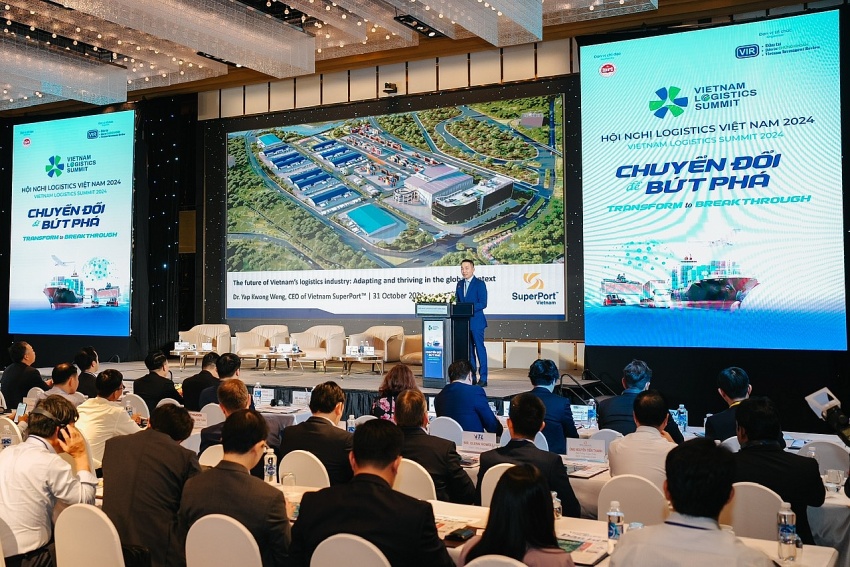 |
| Dr. Yap Kwong Weng, CEO of Vietnam SuperPort was the keynote speaker themed "The future of Vietnam’s logistics industry: Adapting and thriving in the global context" |
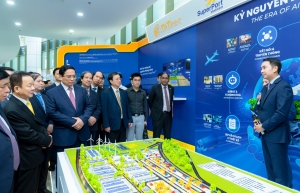 | Vietnam SuperPort unveils digital transformation plan to boost connectivity The ICD Vinh Phuc (Vietnam SuperPort), jointly developed by a T&T Group - YCH (Singapore) joint venture, announced plans to drive efficiency and sustainability in the logistics sector at the Vietnam Innovation Day 2024 on October 1. |
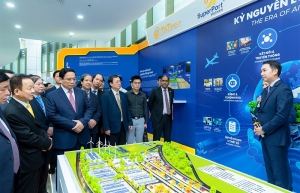 | Vietnam SuperPort lives up to name with sustainability drive Vietnam SuperPort, a joint venture between YCH Group of Singapore and Vietnam’s T&T Group, is at the forefront of sustainability and digital changes to build the first net-zero multi-modal logistics hub in Southeast Asia. |
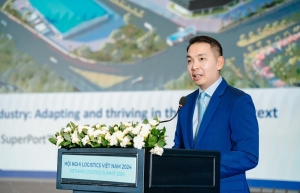 | Vietnam SuperPort poised to elevate Vietnam's logistics capabilities Vietnam SuperPort, a joint venture between YCH Group of Singapore and Vietnam’s T&T Group, is poised to enhance Vietnam’s logistics capabilities in the global supply chain. |
What the stars mean:
★ Poor ★ ★ Promising ★★★ Good ★★★★ Very good ★★★★★ Exceptional
Related Contents
Latest News
More News
- Digital shift reshaping Vietnam’s real estate brokerages (December 31, 2025 | 18:54)
- Allen & Gledhill recognised as Outstanding M&A Advisory Firm (December 18, 2025 | 14:19)
- Inside Lego Manufacturing Vietnam (December 18, 2025 | 11:45)
- The next leap in Cloud AI (December 11, 2025 | 18:19)
- Vietnam’s telecom industry: the next stage of growth (December 11, 2025 | 18:18)
- Five tech predictions for 2026 and beyond: new era of AI (December 11, 2025 | 18:16)
- CONINCO announces new chairman and CEO (December 10, 2025 | 11:00)
- How AWS is powering the next-gen data era (December 09, 2025 | 13:14)
- Outlook in M&A solid for Singapore (December 08, 2025 | 10:31)
- Vietnamese firms are resetting their strategy for global markets (December 05, 2025 | 17:04)

 Tag:
Tag:




















 Mobile Version
Mobile Version